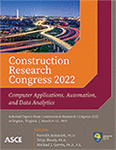Theoretical Architecture for Data-Quality-Aware Analytical Applications in the Construction Firms
Publication: Construction Research Congress 2022
ABSTRACT
The data-analytics solutions are currently more needed to be implemented regarding construction firms to allow for more flexible operations and higher productivity. Yet these data analytical applications are difficult to undertake because of low-level awareness and control of data quality. Through literature review, this paper identifies that the integrated applications that fuse multiple data sources and apply advanced algorithms become a research trend. However, an approach to assessing and controlling data quality is missing in these applications. This paper conceptualizes a novel framework for Data Quality Assessing and Controlling (DQAC), based on the cycle of Total Data Quality Management (TDQM). Then, this paper designs the architecture of DQAC and elaborates the functionalities and main components, which could be the theoretical foundation for building a data-quality-aware analytical application. The data quality measuring engine translates queries and retrieving quality information from the data wrapper, also it generates a data quality profile. Quality control strategies complete the TDQM cycle on both the level of extraction, transformation, and loading (ETL) process and data warehouse operation. Future research needs to develop a prototype to validate the DQAC using empirical data.
Get full access to this article
View all available purchase options and get full access to this chapter.
REFERENCES
Barateiro, J., and Galhardas, H. (2005). A survey of data quality tools. Datenbank-Spektrum, 14(15-21), p.48.
Batini, C., Cappiello, C., Francalanci, C., and Maurino, A. (2009). Methodologies for data quality assessment and improvement. ACM computing surveys (CSUR), 41(3), pp.1–52.
Bloch, T., and Sacks, R. (2020). Clustering Information Types for Semantic Enrichment of Building Information Models to Support Automated Code Compliance Checking. Journal of Computing in Civil Engineering, 34(6), p.04020040.
Bueno, M., González-Jorge, H., Martínez-Sánchez, J., and Lorenzo, H. (2017). Automatic point cloud coarse registration using geometric keypoint descriptors for indoor scenes. Automation in Construction, 81, pp.134–148.
Cichy, C., and Rass, S. (2019). An overview of data quality frameworks. IEEE Access, 7, pp.24634–24648.
Chou, J. S., and Tseng, H. C. (2011). Establishing expert system for prediction based on the project-oriented data warehouse. Expert Systems with Applications, 38(1), pp.640–651.
Fan, J., Han, F., and Liu, H. (2014). Challenges of big data analysis. National science review, 1(2), pp.293–314.
Fitz, D. V., and Saleeb, N. (2019). Examining the quality and management of non-geometric building information modelling data at project hand-over. Architecture Engineering and Design Management., 15(4), pp.297–310.
Gandomi, A., and Haider, M. (2015). Beyond the hype: Big data concepts, methods, and analytics. International Journal of information management, 35(2), pp.137–144.
Hazen, B. T., Boone, C. A., Ezell, J. D., and Jones-Farmer, L. A. (2014). Data quality for data science, predictive analytics, and big data in supply chain management. International Journal of Production Economics, 154, pp.72–80.
ISO/IEC 25012:2008. Software engineering -- Software Product Quality Requirements and Evaluation (SQuaRE) -- Data quality model.
ISO/IEC 25024:2015. Systems and software engineering -- Systems and software Quality Requirements and Evaluation (SQuaRE) -- Measurement of data quality.
Katseff, M., Peloquin, S., Rooney, M., and Wintner, T. (2020). Reimagining infrastructure in the United States: How to build better. McKinsey Insights: Capital Projectts and Infrastructure, July, pp. 1–10.
Kwon, O., Lee, N., and Shin, B. (2014). Data quality management, data usage experience and acquisition intention of big data analytics. International journal of information management, 34(3), pp.387–394.
Lee, Y. W., Pipino, L., Strong, D. M., and Wang, R. Y. (2004). Process-embedded data integrity. Journal of Database Management, 15(1), pp.87–103.
Lepenioti, K., Bousdekis, A., Apostolou, D., and Mentzas, G. (2020). Prescriptive analytics: Literature review and research challenges. International Journal of Information Management, 50, pp.57–70.
Love, P. E. D., Zhou, J., Matthews, J., Sing, M. C., and Edwards, D. J. (2017). System information modelling in practice: Analysis of tender documentation quality in a mining mega-project. Automation in Construction, 84, pp.176–183.
Martínez-Rojas, M., Marín, N., and Miranda, M. A. V. (2016). An intelligent system for the acquisition and management of information from bill of quantities in building projects. Expert Systems with Applications, 63, pp.284–294.
Merino, J., Caballero, I., Rivas, B., Serrano, M., and Piattini, M. (2016). A data quality in use model for big data. Future Generation Computer Systems, 63, pp.123–130.
Oracle. (2018). The State of Construction Project Management Technology. Available at: https://www.oracle.com/a/ocom/docs/dc/ne/stateofconstprjmanagementtechnology.pdf.
Russell, A. D., Chiu, C. Y., and Korde, T. (2009). Visual representation of construction management data. Automation in Construction, 18(8), pp.1045–1062.
Solihin, W., Eastman, C., Lee, Y. C., and Yang, D. H. (2017). A simplified relational database schema for transformation of BIM data into a query-efficient and spatially enabled database. Automation in Construction, 84, pp.367–383.
Soibelman, L., and Kim, H. (2002). Data preparation process for construction knowledge generation through knowledge discovery in databases. Journal of Computing in Civil Engineering, 16(1), pp.39–48.
Torres, R., and Sidorova, A. (2019). Reconceptualizing information quality as effective use in the context of business intelligence and analytics. International Journal of Information Management, 49, pp.316–329.
Wang, J., Zhong, D., Wu, B., and Shi, M. (2018). Evaluation of compaction quality based on SVR with CFA: case study on compaction quality of earth-rock dam. Journal of Computing in Civil Engineering, 32(3), p.05018001.
Wang, R. Y., and Strong, D. M. (1996). Beyond accuracy: What data quality means to data consumers. Journal of management information systems, 12(4), pp.5–33.
Westin, S. (2013). Data and information quality research in engineering construction projects: A review of literature. In Building Sustainable Information Systems, pp. 583–594.
Zhao, Y., Tang, L. C., Darlington, M. J., Austin, S. A., and Culley, S. J. (2008). High value information in engineering organisations. International Journal of Information Management, 28(4), pp.246–258.
Information & Authors
Information
Published In
History
Published online: Mar 7, 2022
Authors
Metrics & Citations
Metrics
Citations
Download citation
If you have the appropriate software installed, you can download article citation data to the citation manager of your choice. Simply select your manager software from the list below and click Download.
